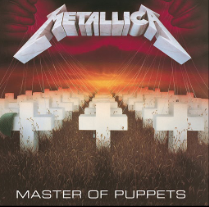“Harvester of Sorrow” by Metallica
The official Genius explanation of the song puts forth that the vocalist is a portraying the role of a man who was the victim of serious child abuse and has been traumatized accordingly since. And with that in mind, one suggestion we would like to offer, to lay the groundwork for this analysis, is that the titular “harvester of sorrow” would be the vocalist himself.
To harvest something, most simply put, means to gather it. And due to the “misery” he has suffered, as most clearly put forth in the first verse, the narrator would be the one who is ‘harvesting sorrow’.
However, there have been other, more intricate explanations offered to the type of character he is meant to portray. And where the confusion, if you will, sets in is during the latter parts of the song, i.e. the second and third verses. For instance, the third can be taken as alluding to the narrator committing “infanticide”.
Some analysts have credibly postulated, from a symbolic standpoint, that said reference centers on the narrator once again harping back to his own experience, i.e. having his own childhood stolen from him – or ‘being cheated of his youth’, as stated in the first verse. In other words, metaphorically speaking he is a victim of “infanticide”. And such an understanding would also imply that the abusive, drug-fueled parent portrayed in the second verse wouldn’t be the singer himself, even though the lyrics kinda read as such.
Takeaway
So let’s conclude by saying that this song, particularly the latter two verses, can be taken in one of the two ways. Either the vocalist is depicting himself as the victim of child abuse or the perpetrator of it. In the chorus, he adlibs the line “harvest of sorrow” with a mention of the “language of the mad”.
So in that regard, we’ll take it that James is referring to the curse words or what have you which people who commit violent child abuse conventionally utter in the process of doing so. And with that in mind, it can also be argued that “harvester of sorrow” is a designation rather being granted to the abuser than the victim.

But what if the abuser and the victim are one in the same? Or putting all of that together, what is possibly going down is this. Victims of child abuse are known to subsequently go on to abuse their own children. So in the first verse yes, the vocalist may be harping back to when he was a child and being mistreated.
But the latter two may be relaying how he, as a result, has grown up to be an abusive parent himself, to the point where he ends up murdering his own baby. Or more simply put, Metallica may theoretically be speaking to the reality of intergenerational child abuse. But in any event, it can be ascertained that the band doesn’t take kindly to the mistreatment of children.
Facts about “Harvester of Sorrow”
Elektra Records introduced this song to the world on 25 August 1988, with it being the lead single from Metallica’s album “…And Justice for All”.
This track proved to be a mild hit, as in barely cracking the top 20 of the UK Singles Chart and also charting in a few other nations.
Metallica’s Lars Ulrich and James Hetfield are recognized as the writers of Harvester of Sorrow. The pair also produced the track with Flemming Rasmussen.

“…And Justice for All” by Metallica
“…And Justice for All” was released on August 25 of 1988 by Metallica. The album was put out as their 4th studio album.
It was produced by band members, Hetfield and Ulrich with support from American record executive cum music producer Rasmussen.
Warner Music Group’s Elektra Records was the record label responsible for its release.
On 11th of September, 1988, the band embarked on the “Damaged Justice Tour” a concert tour aimed at promoting the album.
In 2003, the album received an 8x Platinum certification from the RIAA for selling over 8 million copies in the US. It reached Platinum status in the UK, Switzerland, Poland, Finland and Argentina. It was certified 2x Platinum in Australia, 3x Platinum in Canada, 2x Platinum in Germany and Gold in New Zealand as well as Norway.
“…And Justice for All” peaked at No. 6 on the Billboard 200 and topped Finland’s “Suomen virallinen lista”. The album put up enviable performances on major charts globally, including:
- UK – 4
- Switzerland – 7
- Sweden – 5
- Portugal – 9
- Poland – 7
- Norway – 8
- Germany – 3
At the annual Grammy Awards in 1989, the album won a nomination for “Best Hard Rock/Metal Performance Vocal or Instrumental”. It however, lost it to “Crest of a Knave” by Jethro Tull. At the same event, a song on the album with the title “One” took home the award for “Best Metal Performance” giving Metallica their first ever Grammy win.








